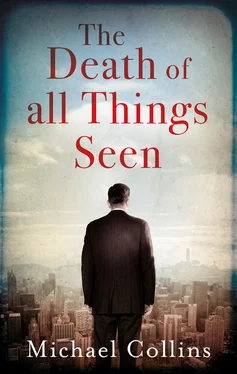On the ground she had drawn a circle around Per and around her people, and then another around Nate, and around herself, and then a greater circle around the entirety of circles so it made sense of life in the way she lived it.
In taking him in the circle of her arms and the girdle of her hips, she created another circle, so he felt the pulse and twitch of energy, the give of her insides in the gentle pulling oneness, letting him find his way back to a place of first origins. This is how love should find two people, conjoined as one.
*
Nate was on the road by five forty-five. He passed the graveyard where his father was interred, the hoary frosting on the lawn so it looked, not so much a graveyard, but a golf course.
It was strange, the converging landscape of places. He was seeing life through Ursula’s eyes. What he remembered of his father was a succession of afternoons at the Winnetka Country Club, a mid-morning splash of soda and dash of Scotch poured from a flask in an allotted recklessness essential to confronting life, his father smoking in deep pulls, a smokiness that blued the air, then waving his way out of the smoke in the sheer act of remembrance, as though he had come from a distant front, which, of course, he had.
His father had returned from the war in the South Pacific as an atheist, a hero, though he hadn’t felt like one. It was a disaffection that beset many of his generation, yet it never found a name like it did in Vietnam. Medication was self-administered from a bottle.
His father had favored golf as the modern incarnation of hushed containment of how the world might yet be recouped. He was deadly serious. Golf came closest to the dignified reach of what American greatness could maintain after the turmoil of two world wars, a refinement of the wild links courses of Scotland, re-envisioned as a more attenuated game played along the sunbaked peninsula of Florida, and up through the swelter of Augusta, or in the dry desert of Palm Springs. This, his father believed, was how you reoriented a society, set the quiet bounds of restriction within the greater illusion of a democracy. You set a man like Arnold Palmer out there, Arnie’s Army!
His father liked Palmer best for his expansive vision, for the far reach of his firmly hit tee shot. A ball sailing along the fairway, the entire gallery following its course with hushed admiration, knowing it should, or would, land, and most always did, within ten yards of what was expected.
His father was proud that America could offer the world a man of such distinguished character and grace; Palmer, a man most comfortable in the bosom of the great democracy, walking calmly among enthusiastic spectators. The British Empire had fallen because of snobs and bores with a great imperial condescension of its subjects, and here was Palmer, a new man for a new age; a man among men.
What his father liked was the keen sense of the predictable: Palmer, deferential, genteel, nodding to his club-laden caddy, conferring intent with simple eye contact, suggesting a six or seven iron on the approach shot, and then proceeding with a striding advance along a flush of fairway, and arriving at the velvet texture of the green that called for a more deliberate, more thorough read of the way the lines broke, the wide arc of Palmer’s putt improbably breaking toward the hole along a line of sight only Palmer could read. And then the tempered applause, while, in the offing, the prospect of a well-made drink awaited, poured by a good-natured Negro at the clubhouse, where neither Negroes nor women alike, were ever going to become members. There were simply bounds that needed to be kept.
It was easy to analyze history, to see a grave and assess a life, when the dull stuff of everyday life disappeared, leaving the subconscious to decide what was worth keeping.
*
Nate was not guiltless. There were other reasons beyond his relationship with his father that had kept him away, reasons connected to what might have been conceivably criminal acts. Nate had done something awful before he left for Canada.
In its most poetic terms, he had taken down the fawn of innocence, or that was how Frank Grey Eyes might have put it if he had known about it. There were legal terms, though, for what he had done, statutory rape was one that fitted with the way he had pushed himself on his best friend’s kid sister Janice Marsh, compelling her to give up something that should have been cherished and preserved for someone truly deserving.
He kept nothing back from Ursula. She had quieted him, told him how she loved him and to stop. It was enough. She told her own story over his. When she walked, she had a slight limp from when Frank had kicked her and broken her hip. Each time she walked she felt not her pain, but the dull ache of Frank’s regret, so it was completed, in the way everything was completed. When she limped, she did so with the memory of Frank, the bone wove his anger and love and frustration into her hip.
Nate thought about it as he drove in a slow circle through his old neighborhood before heading back into town, the way the circle might be closed.
He checked the digital clock. It was not yet quite six in the morning. In looking up, he nearly collided with a Lincoln as big as a hearse. It was his fault. He made eye contact with the driver to acknowledge that he had been in the wrong. There were two men sitting up front. He saw the red pulse of a cigarette glow in the dark orb of the driver’s head, and a soft glow showed the pair of eyes of the passenger, but just for a moment.
DANIEL EINHORN GAVE his lawyer the location of a deposit box and where a key was hidden for his Chicago Union Club locker. There was a stash of money, along with bonds and securities that could be accessed and that, with discretion, if his children adjusted and spent wisely, if they stayed below the radar of the IRS, if the sum of their purchases was not too extravagant — they might find helpful, and, in the long run, when the IRS stopped looking, when the present scourge of accountability passed, they could resume life in the natural order where there would always be a separation of the rich from the poor.
Einhorn was not a snob in believing this, more a realist, aligned with how even Jesus conceded the poor would always be among us, so the Almighty could live with around 7 per cent unemployment, the best that could be hoped for in an imperfect world.
He was deadly serious in his general assessment of the economy and life in general. Nothing was a given, nor could anything be taken for granted. It was all earned. You were as good as how far you could stretch a lie, reel in expectations, and deliver within a margin of agreeable return.
Yes, there was the grim understanding that it had all been a great cash grab, the millions stashed in the deregulation of markets that allowed and damn-near sanctioned fraud when circumstances might have turned out differently if expectations had been tempered, if the realities of a flattening of growth and wages and the demise of what was formerly known as the middle class had been acknowledged. But expectations had not been tempered. It was not just the Wall Street fraudsters, but greed spurred by those insufferable alleged victims, who, in demanding upwards of 20 per cent minimum return on investments, simply looked the other way as financial shenanigans were set in place to hide the truth that there were no more good paying jobs, and that what had existed in their parents’ time, a true and honest middle class, was long gone.
What Einhorn believed, if he were truly pushed, was that there was a point just before the grand deception of his and Saul’s fraud, when there had been Vision and Hope. He had worked with special interest groups related to gaining eminent domain along a corridor running through three contiguous states for a Wind Farm along Tornado Alley. They had a prospectus drawn up, the facts and returns. It was a legitimate venture. The valuation ran into the billions. It would have covered all the losses, reconciled the Ponzi scheme and made it right. They were ahead of the curve on Thinking Green. This was good for America, for sustainable homegrown energy and domestic jobs, a win-win along fallow tracts of land that could easily have been used, and yet, it proved an insurmountable legal undertaking tied to absolute bureaucracy at the State and Federal levels.
Читать дальше












